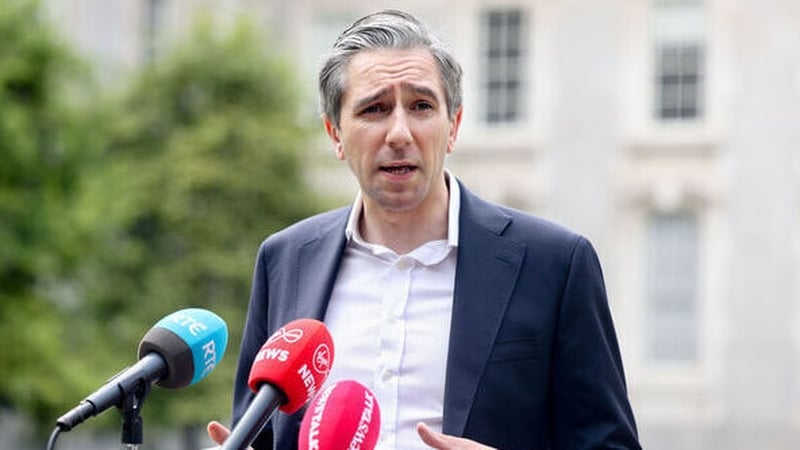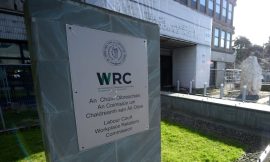The Tánaiste has said the Irish economy will continue to grow and jobs will be created, but at a lower rate, according to a preliminary analysis by the Department of Finance of the impact of the 15% US tariff on EU products.
Simon Harris – who is Minister for Foreign Affairs and Trade – was speaking following a meeting of the Trade Forum at Government Buildings in Dublin.
“Without a deal between the US and the EU, today would have seen 30% tariffs introduced by President Trump on the EU, and would also have seen very, very significant counter measures introduced by the EU to the tune of around €90 odd billion,” he said.
“There’s absolutely no doubt that that would have been a moment of catastrophe in terms of our economic wellbeing as a country.
“We’d be in a very different and a much worse position, I think, if we were standing here today with no deal.
“You don’t have to take my word for that, if you just see the executive order last night and all of the tariffs levelled in other countries, including countries that didn’t have deals.
We need your consent to load this rte-player contentWe use rte-player to manage extra content that can set cookies on your device and collect data about your activity. Please review their details and accept them to load the content.Manage Preferences
“They were generally much, much higher than the tariff rate for the European Union,” Mr Harris said.
Today had been set as the deadline for reaching a trade deal, but following a breakthrough in talks last Sunday, an agreement was reached on a 15% levy on most EU exports to the United States, expected to take effect on 7 August.
Concern of potential of tariff differentials on island of Ireland
The forum was also updated on the recently agreed Action Plan on Market Diversification.
The initiative, which has been developed jointly by the Department of Enterprise, Tourism and Employment and the Department of Foreign Affairs and Trade, is aimed at enhancing Ireland’s trading relationships with existing, new and emerging markets.
The Irish Exporters Association welcomed it but again called for a tariff adjustment fund to assist impacted businesses.
Employers group Ibec and the Irish Farmers Association expressed concerns about the potential of two tariffs rates on the island of Ireland.
But Mr Harris said it is the Government’s understanding that the EU’s 15% rate includes previous tariffs while the UK’s 10% levy is not inclusive.
It was the seventh meeting of the Trade Forum, which includes State agencies, business groups, unions and senior ministers, to map out Ireland’s response to the agreement.
Mr Harris also briefed the forum on the ratification EU-Canada trade deal, known as CETA.
“The proposed amendment to the Arbitration Act 2010 is an essential enabling condition for the ratification of CETA and other similar Free Trade Agreements with third countries that include investment protection provisions, including Singapore, Vietnam, Chile and Mexico,” he said in a statement before the meeting.
“As such, this work is an important part of Ireland’s diversification strategy, reducing concentration risk among our trading partners”.

Business groups say that while some certainty has been provided from the reaching of a trade deal, there are still many unanswered questions about the terms of the framework agreement.
Speaking as he arrived for the forum meeting, the Chief Executive of the Irish Exporters Association called for “clarity”.
Simon McKeever said he would “like to hear the European Union speaking, it’s very one sided at the moment from the White House.”
He said a joint press release from the EU and US giving some details and facts about what this trade deal means is needed.
“Right now, we need certainty on the date. Is it really the 7 August or not the 7 August? What’s happening with pharma, if there’s still a section 232 investigation?” he stated.

Mr McKeever also said while the Government’s Action Plan on Market Diversification is a welcome move, supports for impacted businesses are needed in the short-term.
“Immediately, companies will need help, because they’re going to need time to adjust,” he said.
“It’s very difficult to replace the amount of trade that we’re doing with the United States. So a tariff adjustment fund, which we’ve called for, gives time for that adjustment, keeps employees tied to the company,” he added.
“And don’t forget the logistics and transport sector in all of this, because if there’s any downturn in exports off the island, then those companies will suffer as well,” he cautioned.
Speaking on RTÉ’s Morning Ireland, Mr McKeever also said that trade has been totally upended away from WTO rules to individual bilateral relationships with the US.
He said he would be concerned that anything that Ireland might do or that the European Union might do would change the terms any deals going forward “because they’re not binding”.
He said that the mood has dampened in companies since the start of the year.
Mr McKeever said that the markets are “pretty much liking what Donald Trump is doing” and over the long term there is a deliberate policy from what we can see for the US to weaken the dollar.
The chief executive of Ibec said the possibility of two different tariff rates on the island of Ireland would be a focus of the meeting.

Exports from Northern Ireland into the US are subject to a 10% levy, under the deal made between the UK and the US.
Danny McCoy said the Windsor Framework – the post-Brexit trading agreement – has “potentially come under strain now, with the UK at 10% and the EU at 15%.”
He said the disparity could have a big impact on businesses.
“People talk about very obvious ones, like whiskey production, but any kind of manufacturing in time with that type of differential, if the margins are low. We could see quite a fair bit of competition and leakage between Ireland and Northern Ireland,” Mr McCoy said.
“That’s not a bad thing in itself, but at least it should be controlled,” he added.
The Director General of the Irish Farmers Association said everyone is “looking for more clarity” in the tariffs issue.
Damien McDonald also said the IFA is “concerned” about a potential disparity between tariffs on the island of Ireland.
“We operate very effectively on an all-island basis and while the difference between 15% and 10% mightn’t sound that much, it could bring a huge additional administrative burden into play,” he said.
Mr McDonald said the differentiation “creates further uncertainty and it does place potentially producers in the Republic of Ireland at a disadvantage.”
The Chief Executive of ISME, which represents small and medium businesses, said small businesses can not plan in an environment where there is ongoing uncertainty.
Neil McDonnell most of the small business he represents are involved in either whiskey, confectionery, fancy goods and chocolate exports.

“We don’t expect government to have all the solutions, but what we do expect them to recognise is that small businesses have a really significant problem planning what they’re going to do in this environment,” he said.
“You can’t book a container to the United States carrying wine or spirits in that environment. The buyers don’t know what the landed price is going to be. So in an environment like that, people don’t take risk and they simply don’t sell,” he explained.
Mr McDonnell said the uncertainty is “already hurting businesses.”
“We’re experiencing the pain right now. It’s not something that’s going to happen in the future. You’ve seen distilleries closing already on the back of what’s happening right now,” he stated.
He said a tariff of 15% on the food and drink exporters would be “detrimental.”
“Some sectors are going to be able to handle 15%, if they’re in a higher margin sector of business. Others are not. But whatever it is, we just want to see a horizon where rates remain static for a period of time that allows businesses to plan where we are today. That can’t take place. Businesses can’t plan,” he added.



